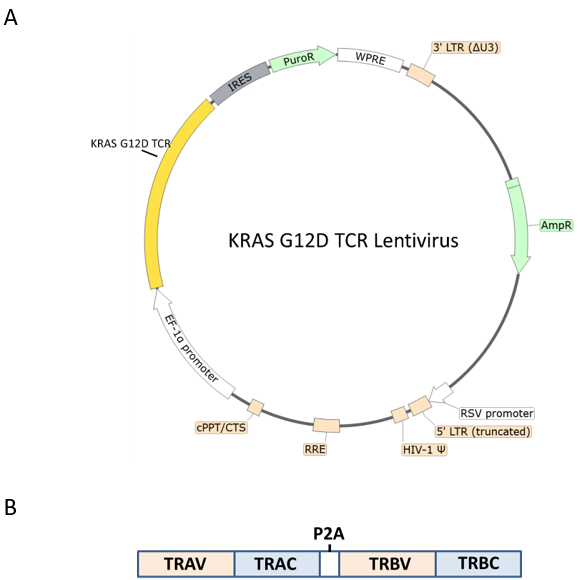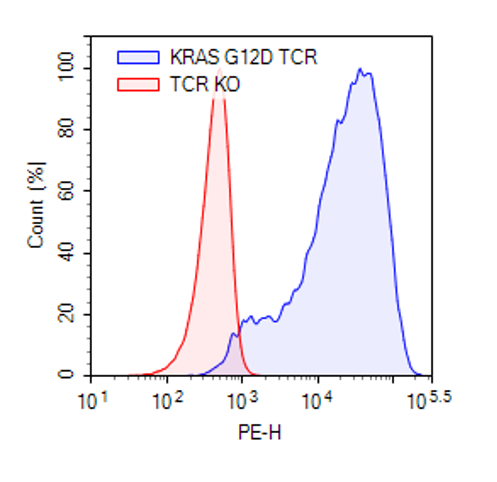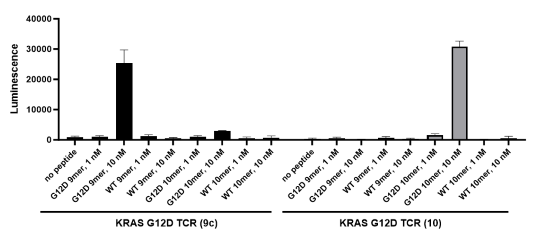KRAS G12D-Specific TCR Lentivirus (Clone 10)
KRAS G12D-Specific TCR Lentivirus (Clone 10) are replication incompetent, HIV-based, VSV-G-pseudotyped lentiviral particles ready to transduce nearly all types of mammalian cells, including primary and non-dividing cells. These viruses transduce cells with a TCR (T cell receptor) (clone 10) that specifically recognizes the human antigen KRAS (Kirsten rat sarcoma virus) G12D, and in which the TCR α chain and β chain are linked by P2A. The lentiviruses also transduce a puromycin selection marker (Figure 1). Mouse TCR constant regions were used in this construct to boost expression.

Figure 1. (A) Schematic of the lenti-vector used to generate the KRAS G12D-Specific TCR Lentivirus (Clone 10) and (B) diagram of the construct, showing the components of the KRAS G12D-specific TCR. TRAV and TRAC correspond to the TCR alpha chain variable and constant regions, respectively, whereas TRBV and TRBC correspond to the TCR beta chain variable and constant regions. Mouse TCR constant regions were used in this construct to boost expression.
| Name | Ordering Information |
| Thaw Medium 2 | BPS Bioscience #60184 |
| Growth Medium 2C | BPS Bioscience #79592 |
| Assay Medium 2D | BPS Bioscience #78755 |
| CD8+ TCR Knockout NFAT-Luciferase Reporter Jurkat Cell Line | BPS Bioscience #78757 |
| HLA-C*08:02 K562 Cell line | BPS Bioscience #78974 |
| KRAS G12D Peptide (10-18, 9mer) | BPS Bioscience #78967 |
| KRAS Wild Type Peptide (10-18, 9mer) | BPS Bioscience #78968 |
| KRAS G12D Peptide (10-19, 10mer) | BPS Bioscience #78969 |
| KRAS Wild Type Peptide (10-19, 10mer) | BPS Bioscience #78970 |
| PE anti-mouse TCR β chain Antibody | BioLegend #109207 |
| ONE-Step™ Luciferase Assay System | BPS Bioscience #60690 |
| Lenti-Fuse™ Polybrene Viral Transduction Enhancer | BPS Bioscience #78939 |
The lentiviruses were produced in HEK293T cells in medium containing 90% DMEM + 10% FBS. Virus particles can be packaged in custom formulations by special request, for an additional fee.
KRAS (Kirsten rat sarcoma virus) are GTPase proteins. They cycle between a GDP-bound inactive state and a GTP-bound (active) form, in a process regulated by two accessory proteins: GEF (guanine exchange factors) and GAPs (GTPase activating proteins). Once activated KRAS can bind to its effectors and regulate multiple signaling pathways, such as the RAF (rapidly accelerated fibrosarcoma)-MEK (mitogen activated protein kinase)-ERK (extracellular regulated kinase) or the PI3K (phosphoinositide 3-kinase)-AKT (protein kinase B)-mTOR (mammalian target of rapamycin) signaling pathways. KRAS mutations account for about 85% of all RAS mutations and are considered one of the main drivers of human cancer, such as in PDAC (pancreatic ductal adenocarcinoma). One of the amino acids frequently mutated is glycine 12, with the most common form being G12D. Since KRAS are intracellular proteins, they are not amenable to CAR (chimeric antigen receptor)-T cell-based therapies, and the development of inhibitors has also proved challenging. One strategy involves the use of TCR (T cell receptor)-T cells, targeting this antigen. Specific TCR clones have been identified, with a KRAS G12D-specific TCR (clone 9c) preferentially being reactive against KRAS G12D peptide (10-18, 9mer), in comparison with KRAS G12D peptide (10-19, 10mer) and being unable to recognize the wild-type KRAS peptides. On the other hand, a KRAS G12D-specific TCR (clone 10) is preferentially reactive against KRAS G12D peptide (10-19, 10mer), in comparison with KRAS G12D peptide (10-18, 9mer) and it does not recognize wild-type KRAS peptides. Results from a trial using a KRAS G12D HLA-C*08:02 restricted TCR demonstrated the potential of this approach for the treatment of PDAC. The use of neoantigen specific TCR-T therapies, targeting single amino acid mutations, is thus an exciting and promising cancer therapy.
Eric T., et al., 2016 N Engl J Med 375:2255-2262.
Leidner R., et al., 2022 N Engl J Med 386:2112-2119.



